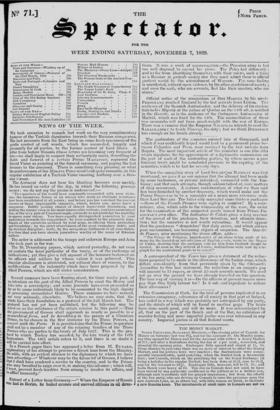NEWS OF THE WEEK.
WE took occasion to remark last week on the very complimentary humour of the Turkish dignitaries towards their Russian conquerors. The last accounts from the East bring us some fresh specimens of the a contest of soft words, which has succeeded, happily and pleasantly for all parties, to the former contest of hard blows. A letter from before Shumla (these letters are becoming very frequent of late—we shall begin to suspect their authenticity soon); describing the death and funeral of a certain Prince MADATOFF. represent the Grand Vizier as assisting at the funeral ceremony, and paying the last honours to the deceased. There is something very pleasing, or what the gentlewomen of the Minerva Press would call quite romantic, in this singular exhibition of a Turkish Vizier'enacting Anthony over a Russian Cmsar.
The Autocrat does not bear his blushing honours over meekly. He has issued an orderof the day, in which the following passage occurs : we do not say the praise is undeserved :
"Two quarters of the world have constantly resounded with your victories; the numerous forces of an enemy who made an obstinate resistance have been annihilated at all Points; and before you has vanished the ancient renown of those impregnable ramparts, which, before you, never knew a conqueror. Boldly passing chains of almost impervious mountains, and striking the enemy even in his most inaccessible retreats, you have constrained him, at the very gate of Constantinople, solemnly to acknowledge his inability to oppose your valour. You have equally distinguished yourselves by your moderation towards the vanquished ; by your conduct to the peaceable inhabitants of the countries subdued by your arms, in offering them protection
and friendship ; by the strict observances of the most exemplary order, and the strictest discipline ; lastly, by the scrupulous fulfilment of all your duties. It is thus that you.have shown yourselves worthy of the name of Russian soldiers.
The order is addressed to the troops and sailors in Europe and Asia who took part in the war. The St. Petersburg papers, which arrived yesterday, do not even yet contain the least particular of the treaty, or of the exchange of ratifications ; yet they give a full account of the honours bestowed on the officers and soldiers by whose valour it was achieved. This singular abstinence is attributed, not without show of reason, to the modifications of the indemnity which have been proposed by the Allied Powers, which are still under consideration.


















